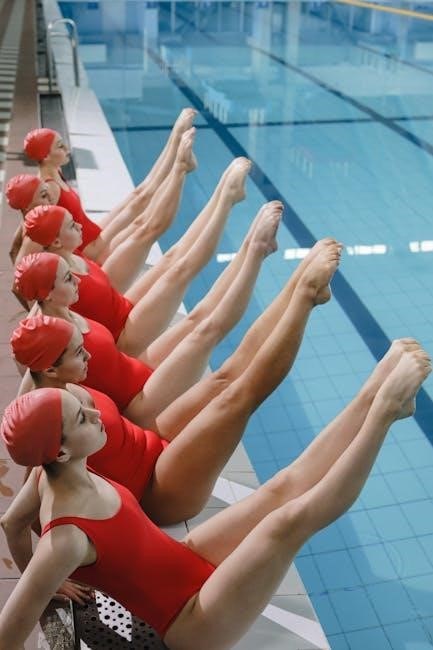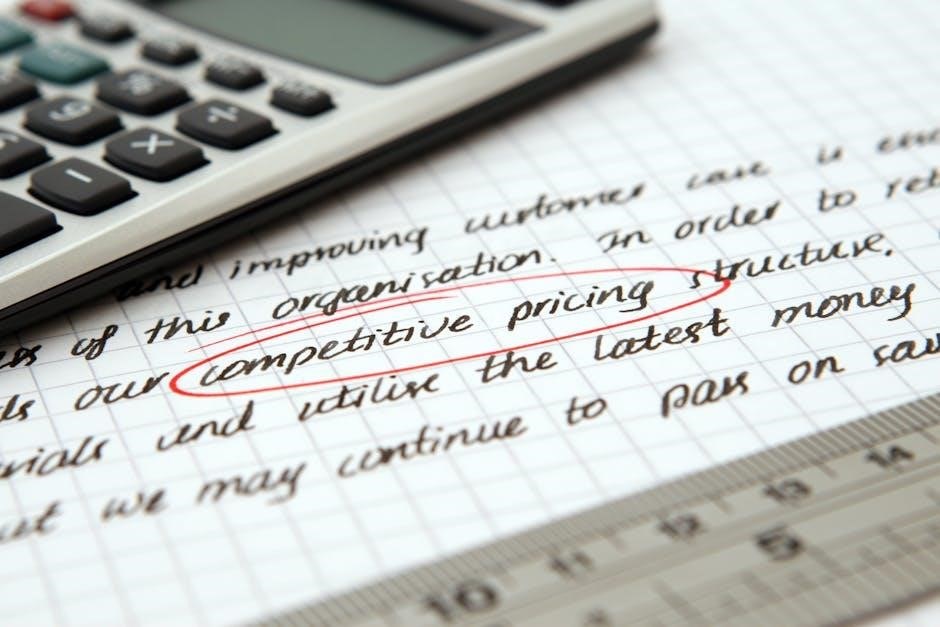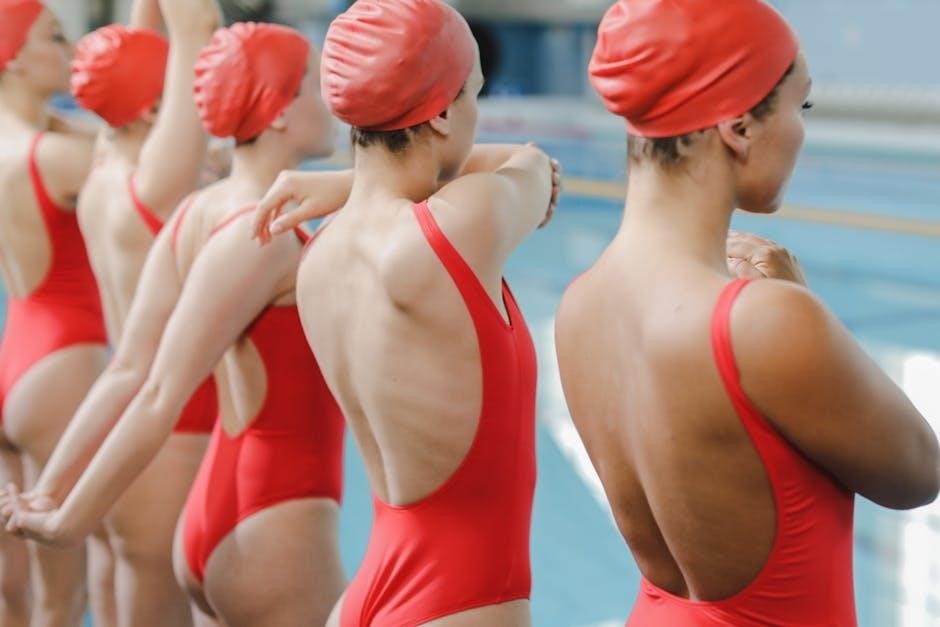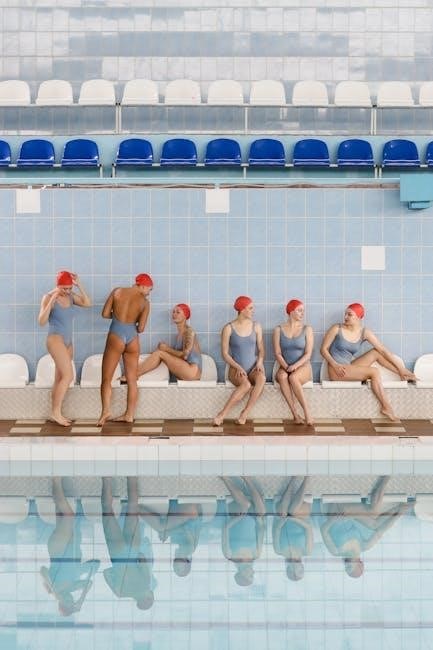A well-structured diet is crucial for competitive swimmers to optimize performance, endurance, and recovery. Proper nutrition ensures energy supply, muscle repair, and hydration, tailored to training and competition demands. Consistency and balance in meal planning are essential to prevent fatigue and enhance overall swimming efficiency.
Importance of Nutrition for Swimmers
Nutrition is vital for swimmers to meet energy demands, support muscle repair, and enhance recovery. A balanced diet ensures optimal performance, prevents fatigue, and maintains overall health. Proper fueling helps swimmers train intensely, recover efficiently, and adapt to physical stress, making nutrition a cornerstone of competitive success in the water.
Overview of Key Nutritional Elements
A competitive swimmer’s diet should focus on carbohydrates for energy, protein for muscle repair, and healthy fats for sustained performance. Hydration and electrolytes are also critical for maintaining physical function during intense training. Balancing these elements ensures swimmers meet their nutritional needs, support recovery, and optimize overall performance in the water.
Energy Needs for Competitive Swimmers
Competitive swimmers require high energy intake due to intense training. Energy needs vary based on training intensity, duration, and individual metabolism, ensuring proper fueling for performance and recovery.
Calculating Daily Caloric Requirements
Calculating daily caloric needs for competitive swimmers is essential to ensure energy balance and optimal performance. Factors include training intensity, weight, metabolism, and recovery demands. Coaches and dietitians often use formulas like basal metabolic rate (BMR) multiplied by an activity factor to estimate needs, typically ranging from 2,500 to 4,000 calories per day for male swimmers, depending on workload. Personalized plans are crucial for accuracy.
Role of Macronutrients in Energy Supply
Macronutrients—carbohydrates, proteins, and fats—are essential for energy production in swimmers. Carbohydrates are the primary fuel for high-intensity efforts, stored as glycogen in muscles and liver. Proteins support muscle repair and function, while fats provide sustained energy and aid in nutrient absorption. Balancing these nutrients ensures optimal energy supply and recovery during training and competition.
Timing of Meals and Snacks Around Training
Proper timing of meals and snacks is vital for energy levels and recovery. A balanced meal should be consumed 3-4 hours before training, with a light snack 45-60 minutes prior. Post-workout nutrition within 30-60 minutes aids recovery. Hydration and electrolyte intake during long sessions are also crucial to maintain performance and prevent fatigue.

Carbohydrates in a Swimmer’s Diet
Carbohydrates are the primary energy source for swimmers, fueling workouts and endurance. Daily needs range from 3-8g/kg of body weight, varying with training intensity and duration.
Types of Carbohydrates for Endurance
Endurance swimmers benefit from complex carbohydrates like whole grains, fruits, and vegetables, which provide sustained energy. Simple carbs, such as bananas or energy gels, are ideal for quick energy during long sessions. Balancing these sources ensures steady fuel supply and prevents energy crashes during intense training or competitions.
Simple vs. Complex Carbohydrates for Performance
Simple carbs, like sugars, provide quick energy, ideal for pre-workout or mid-session boosts. Complex carbs, such as whole grains and starches, offer sustained energy, perfect for long training sessions. Balancing both ensures swimmers maintain energy levels without crashes, optimizing performance and recovery throughout their rigorous routines.
Protein Requirements for Swimmers
Swimmers need 1.2-2.0 grams of protein per kilogram of body weight daily to support muscle repair, recovery, and performance, ensuring they meet the demands of intense training.
Daily Protein Intake Recommendations
Competitive swimmers typically require 1.2-2.0 grams of protein per kilogram of body weight daily, depending on training intensity and muscle repair needs. This ensures adequate recovery and muscle maintenance, with sources like lean meats, fish, eggs, dairy, and plant-based options being ideal for meeting these targets effectively.
Best Sources of Protein for Muscle Repair
Lean meats, fish, eggs, and dairy products are excellent protein sources for swimmers, promoting muscle repair and growth. Plant-based options like beans, tofu, and quinoa also provide essential amino acids. These foods help swimmers recover efficiently, making them ideal for post-workout meals and snacks to maintain muscle integrity and support peak performance in the water.
Timing Protein Intake for Optimal Recovery
Consuming protein within 30-60 minutes post-workout enhances muscle repair and recovery. A mix of protein and carbohydrates in this window helps replenish energy stores. Additional protein servings throughout the day, including before bed, support ongoing muscle recovery and growth, ensuring swimmers are prepared for their next training session.

Fats and Their Role in Swimmers’ Diets
Fats provide sustained energy, support hormone production, and aid in absorbing essential vitamins. Healthy fats like avocados and nuts are crucial for swimmers’ overall health and recovery.
Healthy Fats for Sustained Energy
Healthy fats, such as avocados, nuts, and olive oil, provide sustained energy and support cellular function. They aid in vitamin absorption and reduce inflammation, crucial for swimmers’ endurance and recovery. Incorporating these fats into meals ensures a steady energy supply during intense training sessions and competitions, optimizing performance and overall health.
Recommended Daily Intake of Fats
Fats should comprise 20-30% of a swimmer’s daily calories. Emphasize unsaturated fats like avocados, nuts, and olive oil, while limiting saturated fats. Aim for 0.5-1 gram of fat per kilogram of body weight, adjusting based on training intensity. This balance supports sustained energy and overall health without compromising performance or recovery.

Hydration Strategies
Proper hydration is essential for swimmers to maintain performance and prevent dehydration. Aim to drink water regularly, monitor urine color, and consume electrolytes during prolonged sessions to replenish lost salts and maintain fluid balance for optimal performance and recovery.
Importance of Water Intake
Water intake is critical for swimmers, as even mild dehydration can impair performance and endurance. Swimmers lose significant water through sweat, breath, and immersion, making hydration essential to maintain fluid balance, regulate body temperature, and transport nutrients and oxygen to cells. Proper hydration ensures optimal physical function, focus, and recovery during and after training sessions.
Electrolytes and Their Role
Electrolytes like sodium, potassium, and magnesium are vital for swimmers, as they regulate fluid balance, nerve function, and muscle contractions. Lost through sweat, electrolytes must be replenished to prevent cramps, fatigue, and dizziness. Adequate intake ensures proper hydration, nerve signaling, and muscle recovery, maintaining peak performance and overall health during intense training sessions and competitions.
Hydration During Long Training Sessions
Proper hydration is essential for swimmers during prolonged training to maintain performance and prevent dehydration. Swimmers should drink water before, during, and after sessions. Monitoring fluid levels and adjusting intake based on sweat loss and session intensity ensures optimal hydration, preventing fatigue, dizziness, and muscle cramps, while supporting overall endurance and focus in the water.

Recovery Nutrition
Recovery nutrition is vital for swimmers to repair muscles, replenish energy stores, and support adaptation after intense training, ensuring optimal performance consistency and reducing muscle soreness effectively.
Post-Workout Meal Composition
A well-balanced post-workout meal for swimmers should include a mix of carbohydrates and protein to replenish energy stores and repair muscles; Aim for a 3:1 ratio of carbs to protein, such as whole grains, lean meats, or plant-based options. Include fiber-rich vegetables for digestion and hydration. Consume this meal within 30-60 minutes post-training for optimal recovery benefits.
Snacks for Rapid Recovery
Opt for snacks rich in carbohydrates and protein to aid quick recovery. Examples include bananas, energy bars, yogurt, or smoothies. These snacks replenish glycogen stores and repair muscles. Hydration is also key, so pair snacks with water or a sports drink. Aim for easily digestible options within 30 minutes post-workout to maximize recovery efficiency and reduce muscle soreness.
Nutrition for Overnight Recovery
A balanced evening meal supports muscle repair and replenishes energy stores. Include lean proteins like chicken or fish, complex carbs such as whole grains, and fruits or vegetables. Stay hydrated with water or herbal tea. Avoid heavy or greasy foods that may disrupt digestion. A recovery-focused dinner ensures your body rebuilds and prepares for the next training session effectively.

Nutrition for Competition
Nutrition during competitions focuses on maintaining energy levels and hydration. Opt for light, easily digestible meals rich in carbs and proteins, avoiding heavy or greasy foods.
Pre-Competition Meal Planning
Pre-competition meals should be consumed 3-4 hours before the event, focusing on balanced carbs, lean proteins, and healthy fats. Opt for easily digestible foods like oatmeal, bananas, or whole-grain toast. Avoid heavy or greasy options to prevent stomach discomfort. Hydration is also key, with water or sports drinks to maintain fluid levels and electrolyte balance before racing.
Eating During Competitions
During competitions, swimmers should consume light, easily digestible snacks like energy bars, bananas, or sports drinks. Avoid heavy meals to prevent stomach discomfort. Opt for quick-energy options that maintain hydration and electrolyte levels. Small portions of carbohydrates and electrolytes-rich foods help sustain energy without causing digestive issues during races or between events.
Post-Competition Recovery Nutrition
Post-competition, swimmers should prioritize recovery nutrition within 30-60 minutes to replenish energy stores and repair muscles; Focus on a mix of carbohydrates and protein, such as bananas with peanut butter or a recovery shake. Hydration with water or electrolyte-rich drinks is crucial to restore fluid balance and support muscle function after intense racing.
Supplements in a Swimmer’s Diet
Supplements like protein powders, electrolytes, and multivitamins can support swimmers’ performance and recovery, filling nutritional gaps when whole foods aren’t sufficient or convenient.
Multivitamins and Mineral Supplements
Multivitamins and mineral supplements help swimmers meet daily nutritional needs, especially during intense training. They fill gaps in diets, ensuring adequate levels of essential vitamins and minerals like iron, calcium, and B vitamins. These supplements support energy production, immune function, and recovery, complementing a balanced diet tailored to individual needs and performance goals.
Protein Powders for Convenience
Protein powders offer a convenient way for swimmers to meet their protein needs, especially after workouts or when whole foods aren’t accessible. They support muscle repair, recovery, and growth. Whey and plant-based options are popular choices, providing essential amino acids to aid in performance and muscle maintenance without the bulk of traditional meals.
Electrolyte Supplements
Electrolyte supplements are vital for swimmers to replenish lost salts like sodium, potassium, and magnesium during intense training. These minerals maintain hydration, nerve function, and muscle contractions. Supplements are particularly useful during long sessions or in hot climates, helping prevent cramps and fatigue. They can be added to water or consumed as tablets for quick replenishment and optimal performance.

Sample Meal Plan for Competitive Swimmers
A balanced meal plan includes breakfast with whole grains, lean proteins, and fruits. Lunch features complex carbs, vegetables, and lean meats. Snacks like nuts and fruits provide quick energy, while dinner focuses on protein and recovery-aiding foods. Hydration and electrolyte-rich drinks are emphasized throughout the day for optimal performance.
Breakfast Options
Breakfast should be rich in carbohydrates and protein for sustained energy. Options include oatmeal with fruits and nuts, scrambled eggs with whole-grain toast, or Greek yogurt with berries and granola. These meals provide balanced nutrition, preventing mid-morning fatigue and supporting muscle function during intense training sessions. Pair with a sports drink or water for optimal hydration.
Lunch and Snack Ideas
Lunch should include complex carbs, lean proteins, and healthy fats for sustained energy. Grilled chicken with quinoa and vegetables or whole-grain pasta with turkey are excellent options. Snacks like bananas with peanut butter or energy bars provide quick energy. Staying hydrated with water or electrolyte drinks is crucial throughout the day for optimal performance.
Dinner and Evening Snack Suggestions
Dinner should focus on lean proteins like grilled fish or chicken, paired with complex carbs such as brown rice or sweet potatoes, and steamed vegetables. Evening snacks could include Greek yogurt with berries or a handful of nuts to maintain energy levels and support overnight recovery. Hydration with water or electrolyte-rich drinks is also essential.
A well-rounded diet, consistent hydration, and tailored recovery strategies are vital for peak performance. Balancing nutrients and adjusting plans based on individual needs ensures optimal results.
Consistency in Nutrition Planning
Consistency in nutrition planning is essential for competitive swimmers to maintain energy levels, support recovery, and optimize performance. A structured and repetitive meal plan ensures nutritional needs are met, while flexibility allows adjustments based on training intensity and competition demands. Avoiding extreme dietary changes prevents digestive issues and performance fluctuations, fostering long-term success.
Individualization of Diet Plans
Each swimmer’s dietary needs are unique, depending on training intensity, competition goals, and personal preferences. A tailored diet plan ensures optimal energy supply, recovery, and performance. Consulting with coaches or nutritionists helps create personalized strategies, accounting for specific calorie, macronutrient, and hydration requirements. Adjustments should be made regularly to reflect changes in training phases and individual progress.